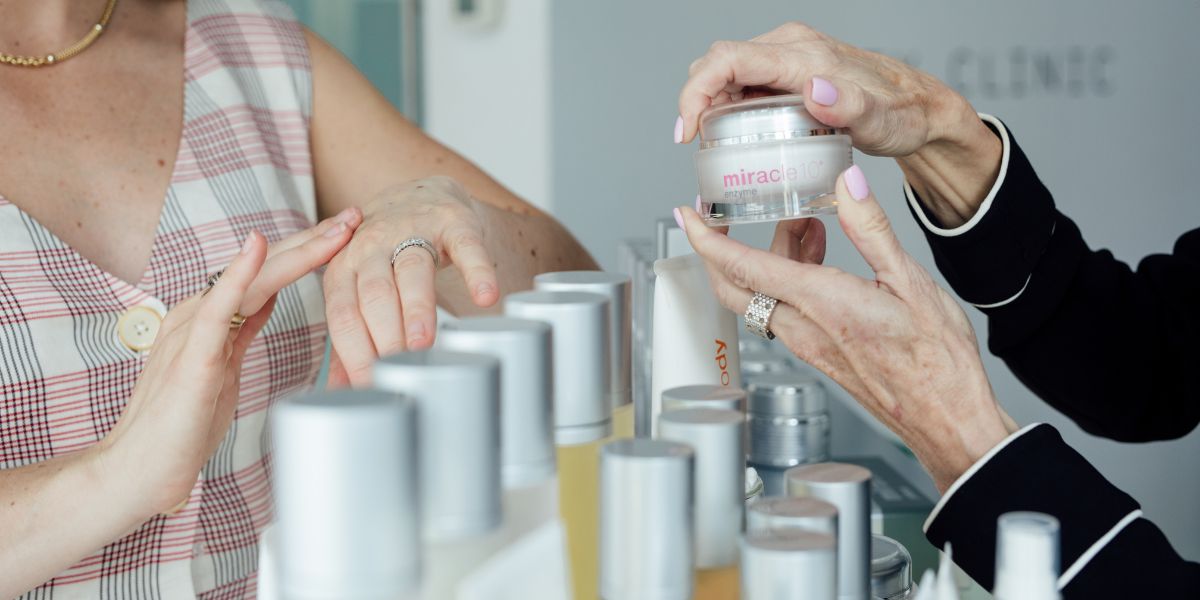In recent years, probiotics have become a buzzword in the skincare industry, and for good reason. While normally associated with gut health, probiotics have been making their mark in the realm of skincare, proposing a host of benefits that go deep beyond the surface.
That's why we're giving you a crash course on the science that's happening on your skin, and how you can help support it. Let's dive into why probiotics might be a game-changer for your skin's health. Class is in session!
Microscopic Minions
The skin's microbiome is a diverse community of microorganisms, like bacteria, that reside on the skin's surface. This microbiome plays a crucial role in maintaining skin health by acting as a protective barrier against harmful pathogens, supporting the immune system, and aiding in regulating inflammation.
A balanced microbiome helps to keep the skin's pH levels stable, which is essential for preventing dryness, sensitivity, and other skin issues. That means disruption to this delicate ecosystem caused by factors like too harsh skincare ingredients, environmental pollutants, or even a poor diet can lead to various complexion issues.
So what does that mean for us? Maintaining a healthy skin microbiome, i.e., keeping your microscopic minions happy, is vital for overall skin health, resilience, and glowing appearance.
The Pre and The Post
Before we go any further, we must differentiate between different skincare ingredients that can impact the microbiome. You’ve got pre-biotics, post-biotics, and our star: probiotics. In case you didn’t know, these terms all refer to bacteria! Don’t worry though, we’re talking about the bacteria that’s good for us and, at times, critical for our survival. #NotAllBugsAreBad
Prebiotics are food that enriches your skin flora. It can be found in skincare to boost the health of your microbiome by keeping it alive. Don’t get us wrong, your skin’s bacteria generally have the means to sustain themselves, but prebiotics can support folks who might be lacking some of that good stuff.
Postbiotics can be fragments of bacteria produced during fermentation. They’re essentially bacteria waste, but don’t be deterred because this can be really beneficial! You may know postbiotics by their more common name: peptides. Peptides can aid your skin in creating more of those cute and crucial proteins that keep us looking radiant. Many of our products are formulated with peptides, including the products in our Platinum Collection that are formulated with our own peptide-complex, EMC10.
Finally, probiotics are the actual, living organisms. Probiotics in skincare are said to help restore the microbiome by introducing beneficial bacteria that support and enhance the skin's natural flora. In doing so, they help to keep harmful bacteria in check, reducing the likelihood of infections and conditions, and promoting a healthier, more resilient skin environment.
The Drama
There are many opinions out there about the efficacy of probiotics in skincare, both professional and otherwise. The current science does not claim that using probiotics in skincare will necessarily alter your natural microbiome. Our bodies are fairly resistant in maintaining balance on their own; it’s how we’ve survived as a species!
That being said, research does support that probiotics in skincare may supplement microbiomes that are experiencing “dysbiosis.” This is a fancy term meaning ‘unbalanced’ or susceptible to disorder. Think of skin conditions like eczema, rosacea and so on. An upset microbiome can wreak havoc on your skin—and remember that the skin barrier is our primary defence against the elements…
When the Microbiome goes Mayhem
Here are three key ways that dysbiosis (a ‘faulty’ microbiome) manifests as skin concerns, and how probiotics might help treat it.
- Unbalanced Skin pH: An unbalanced skin pH can lead to a variety of issues, such as dryness, acne, and sensitivity. Probiotics can help keep the skin's pH within its optimal range by regulating sebum production. Additionally, this prevents the skin from becoming too oily or too dry. This balance is crucial for achieving and maintaining healthy, glowing skin.
- Inflammation: Many common skin conditions like acne, rosacea, eczema, and psoriasis, are associated with inflammation. Probiotics have anti-inflammatory properties that can help to soothe and calm the skin. They work by inhibiting the production of inflammatory markers and promoting a balanced immune response. In fact, many experts will prescribe probiotics before suggesting harsher treatments to address patient skin concerns.
- Exposure to Elements: When our skin barrier is compromised, we are more susceptible to the impacts of environmental factors. This can increase risk of sun damage and accelerate signs of aging. Probiotics can strengthen the skin barrier by increasing the production of ceramides, which are lipids that hold skin cells together and keep things intact. A strong skin barrier is essential for healthy, hydrated, and most of all: resilient skin.
If you’re interested in incorporating probiotic infused products into your skincare, our Platinum Revive and Soothe are 2 of our newest launches that will deliver you the goods! These products also have a medley of other phenomenal ingredients to fortify your skin barrier.
We’ve provided you with quite a bit of information here. The TL;DR: science has yet to 100% prove that probiotics will support an already healthy microbiome, but it does claim that they have the potential to aid in the treatment of skin conditions. By restoring the skin's microbiome with probiotics, you can maintain a balanced skin pH, reduce inflammation to treat related concerns, and protect your skin against the harsh elements.
As the skincare industry continues to evolve, the use of probiotics is likely to become increasingly prevalent, providing you with new solutions for achieving optimal skin health. We wouldn't be surprised if many of your higher-end skincare products already include them in their formulations!
So, will you be embracing the power of probiotics in your skincare routine?

